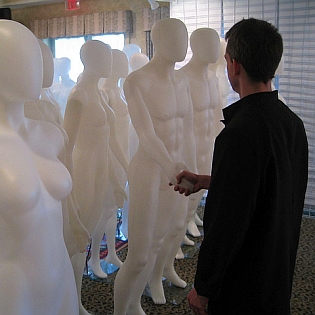Indistinguishability and Modeling- or, To a Friend or Three
 I think that for too many of us, we are brought up to look for role models upon which to model our behavior. This modeling is something that I think is sometimes so very encouraged in some of us- Autistic or otherwise neuroatypical- because we are taught from very young age that we need to blend into social environments, to conform to behavioral expectations.
I think that for too many of us, we are brought up to look for role models upon which to model our behavior. This modeling is something that I think is sometimes so very encouraged in some of us- Autistic or otherwise neuroatypical- because we are taught from very young age that we need to blend into social environments, to conform to behavioral expectations.
Or, to put it in IEP goal language, to “become indistinguishable from [our] peers.”
A number of us in the Neurodiversity movements believe that this is a potentially destructive goal emotionally, and one that is counter-productive ethically. There are numerous essays out there talking about this in the class room context. There’s even some conversations going on about how this inter-plays with integrated classrooms, and how some of our allies who join with us on integration do so because of this idea of modeling “normal” behavior.
We- that is, self advocates- fight a lot against the idea of indistinguishably as a goal. We talk about it as violence, and we try to find ways to stop it from being so central a goal in how people interact with our younger counterparts. We decry it, and try to uproot it.
Too often, though, the damage has already been done for us, even in places in ourselves we don’t want to look.
Feminism talks a lot about how society internalizes messages about women, as do other movements. The truth is we are all socialized in some way or another. But when we go through that process as neurodivergent, we don’t absorb some things that others do. Some of us of course do internalize messages, but some of our socialization around certain skill sets are not served by the process that typical society uses.
Too often, what this means is that we internalize the pleas for “indistinguishbility” from the norms of society, while finding that we don’t have the skills to meet the expectations.
I’m finally getting to why I started this entry: How we model and expect our relationships- with friends, with family, with romantic and/or sexual partners- to work, and how those are supposed to make us feel.
I have an ex, K, who often talked to me about his relationship with his father. K had been brought up with a certain idea of what a father-son relationship should look like, and how he should feel about it. However, none of these were expectations modeled with him in mind. He would watch TV or his brother’s relationship with his father. K would find himself confused and frustrated when he went through the same motions and still felt disconnected from his father.
He took the (socially pressed rather than IEP directed in his case) directive to strive for indistinguishbility and held that up as the goal, the thing that “should” bring happiness if he did it right. After all, the reasonings that are used in society for why this is such goal is often held up as a way to find happiness in the long run.
But the truth is, following modeled behavior doesn’t mean we will be happy. Too often, it means that we aren’t actually building the sort of connections or environments that make us happy or connected. We are basing our expectations of what these should look like on someone else’s happiness, someone else’s feelings of connection to the things in their lives.
We’ve taken the modeling that people provided as a stop gap for indistinguishability- a goal that ignores who we are and what our needs are- and we’ve added it to the things we count as skills. We’ve allowed for things that tear us down to oversee how we build our lives.
I was originally going to write a poem on this, but prose came out instead. I’m going to get to the point before I devolve into poetry again:
If we want happiness, satisfaction in our friendships (and other relationships) we need to stop basing them on other people’s definitions of what they should look like. We need to define them for ourselves.
Savannah Logsdon-Breakstone blogs at Cracked Mirror in Shalott.
Indistinguishability and Modeling- or, To a Friend or Three appears here by permission.
[image via Flickr/Creative Commons]
Savannah Logsdon-Breakstone on 10/4/11 in featured, Society | No Comments | Read More

